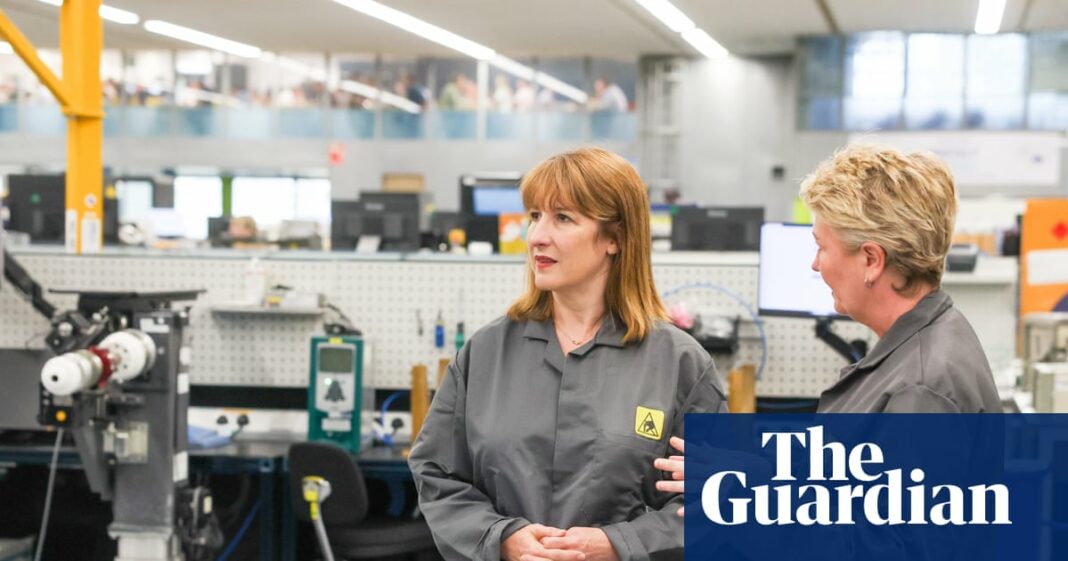If Rachel Reeves is serious about ensuring that Labour’s second year in power is all about a stronger economy that rewards working people across the country (In our first year Labour fixed the foundations – now we must build a stronger economy for a renewed Britain, 13 August), she needs to rethink what your editorial called the UK’s “broken growth model” (6 August). The growth that Britain needs is an increase in economic activity that improves social and environmental infrastructure nationwide. This involves a huge increase in secure, well-paid jobs to rebuild a more resilient future economy.
The last thing that is required is Reeves’s obsession with more deregulation of the City and pressuring savers into investing in the stock market. What is needed instead is a massive increase in a socially and green-oriented bond market that will provide secure returns for savers.
This will require intense pressure to be put on Reeves to shift her emphasis away from global financiers to recognising UK savers as saviours. She should make clear that in return for the tax breaks that those investing in Isas and pensions receive, a considerable percentage of such savings would be invested in green and social infrastructure projects. This would help tackle the climate crisis and rebuild our economy as well as the crumbling cohesion of our society.
Colin Hines
Convener, Green New Deal Group
Rachel Reeves wants to solve Britain’s productivity problem by kickstarting economic growth. Four decades ago, Britain decided to become a consumer economy when others chose to be investment economies. The mistake in tackling the fallout of the global financial crisis after 2008 was to slash capital spending at a time when money was cheap. The chaotic governments of Boris Johnson and Liz Truss created damaging uncertainty for investors. The world has become more uncertain, but political decisions also mean growth each year was on average twice as strong in the 16 years before the financial crisis than in the 16 years sincetaxation as a proportion of GDP has reached historic highs and productivity is painfully weak.
The chancellor needs to be bold and ambitious for Britain’s economy. We must exploit the opportunities of the digital revolution, advance our skills base, join up government so that departments are all focused on growth and become a true investment economy at last.
Prof Stephen Barber
University of East London
Rachel Reeves claims to have fixed the country’s financial foundations in Labour’s first year in office, but I am certain that the 4.5 million children still living in poverty, an increase of 100,000 from the previous year, wouldn’t agree. At the same time, UK billionaires’ wealth increased by £35m a day to £182bnwith Britain having the highest proportion of billionaire wealth derived from monopolies and cronyism among G7 countries.
Dr Michael Symonds
Emeritus Professor University of Nottingham
No, you haven’t “fixed the foundations”, chancellor. Where are the Labour values in “renewal is our mission and productivity is our challenge”? Not a word about redressing the wealth gap between the rich and the poor; not a word about ending the two-child benefit cap; not a word about restoring the level of overseas aid.
Rachel Reeves’s article could have been written by George Osborne – and I for one fear what else that might entail for our dilapidated public space. It isn’t good enough just to be wealthy – it’s what you do with it and how fairly you spread it that counts. That is supposed to be the Labour difference.
Hugh D Bryant
Penarth, Glamorgan
I find it disappointing that Rachel Reeves refers only to “working people”. This indicates that she is not considering other groups such as pensioners, or those who cannot work either through disability or because of a lack of suitable jobs for which they are qualified.
She refuses to target the super-rich, preferring to hit easy targets by keeping the two-child benefit cap, not raising tax thresholds (pushing more people into paying tax and higher tax) and targeting cash Isa allowances. Some people have had bad experiences with stocks and shares and are reluctant to risk their savings again.
She has not learned at least two things from history: first, trickle-down economics does not work, as wealth floods into foreign tax havens, not to the less well off. And second, removing restrictions on the financial sector leads to people and financial organisations being overstretched and a banking crisis.
Keith Eves
Mold, Flintshire



